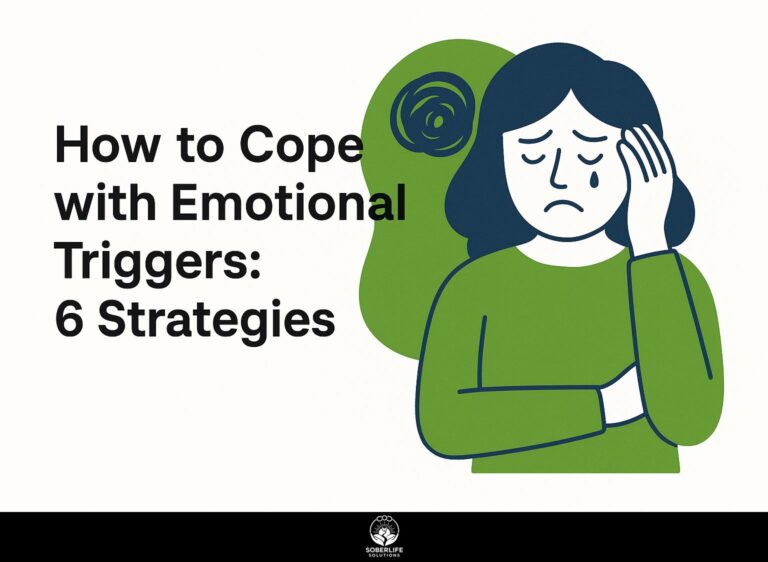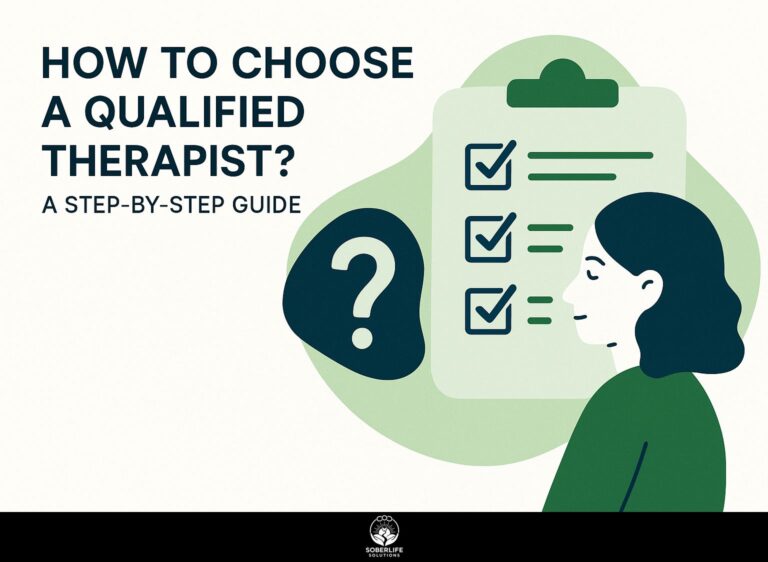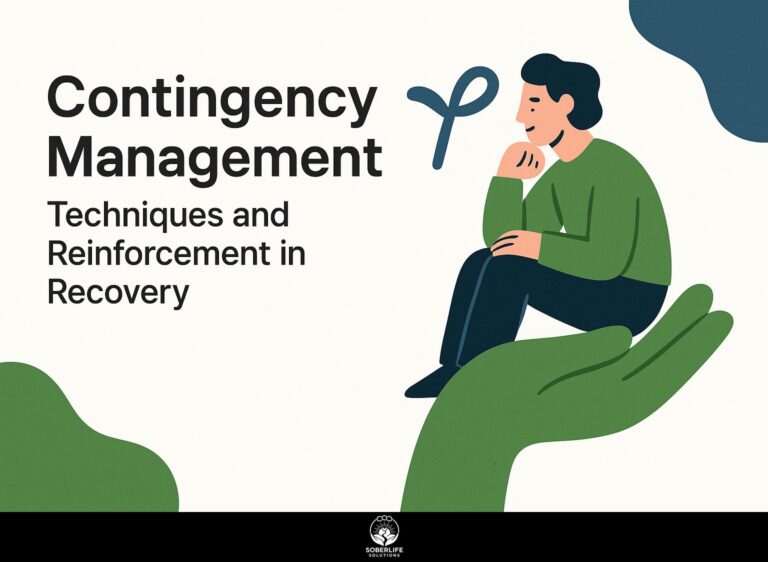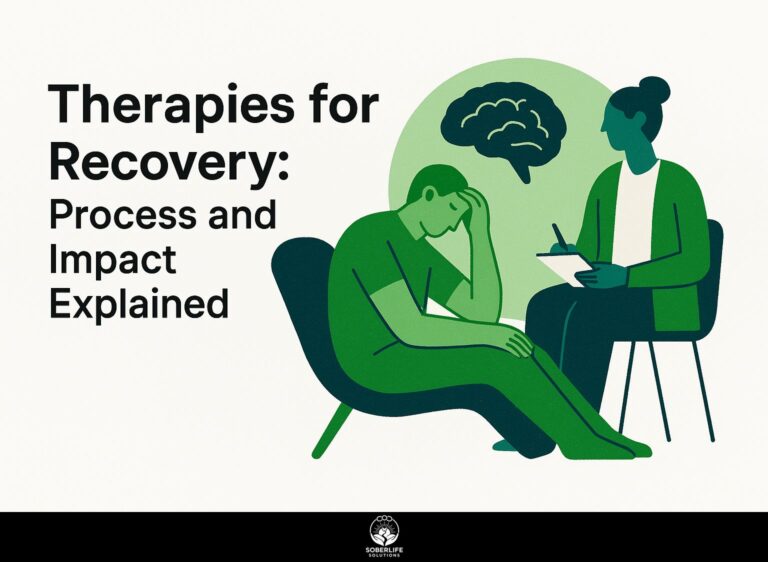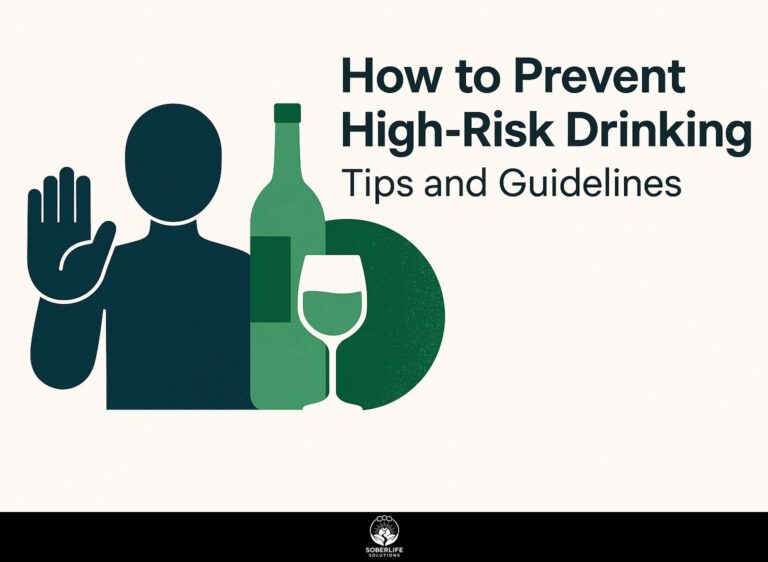Therapist Qualifications: Importance for Relapse Prevention
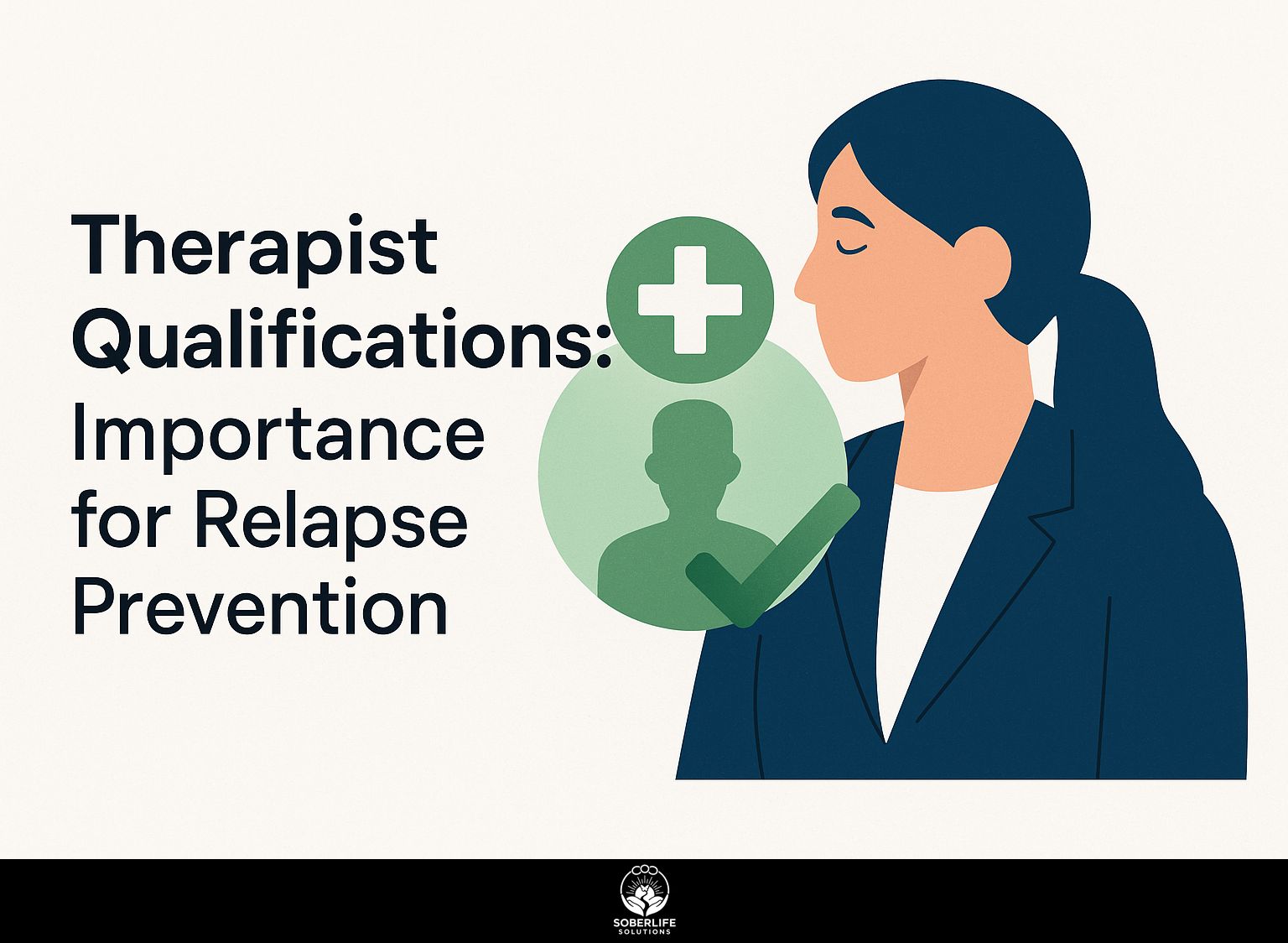
Dealing with addiction recovery is tough, and knowing your therapist’s qualifications is important for successful relapse prevention. Experts use a method that concentrates on thoughts and actions to help clients handle tough situations and improve mental and social support. With the right skills, therapists can create specific plans that greatly improve recovery results. This article discusses the important skills that therapists need to help people overcome addiction and avoid falling back into bad habits.
Key Takeaways:
Definition and Importance
Relapse prevention involves methods that help people stay away from using substances again after completing treatment, focusing on changing behaviors and teaching ways to handle challenges.
Stopping relapse is important for staying sober over time. The plan includes figuring out what causes problems like stress or being around other people, and coming up with ways to handle them. This might involve mindfulness exercises, doing physical activities, or getting help from friends.
The SMART Recovery app lets you track how you’re doing and provides useful details. Changing your life, such as forming a supportive circle of friends and creating daily routines, is important for staying sober.
Together, these parts make a strong system to handle problems and keep getting better.
Statistics on Relapse Rates
Research shows that 40-60% of people in recovery may have a relapse. This highlights the importance of using strategies supported by data to reduce these numbers.
To fight relapse successfully, creating a detailed prevention plan is essential. This involves having regular meetings with a support group, using cognitive-behavioral therapy (CBT) methods to handle triggers, and setting up a healthy daily routine that includes exercise and mindfulness activities.
For instance, individuals might use apps like `Sober Grid’ for community support or `Mindfulness Coach’ for guided meditation. Using tools like a relapse prevention journal can strengthen dedication and responsibility, reducing the likelihood of relapse, a strategy whose effectiveness is underscored by an article in ScienceDirect that analyzes the determinants and prevalence of relapse.
Role of Therapists in Relapse Prevention
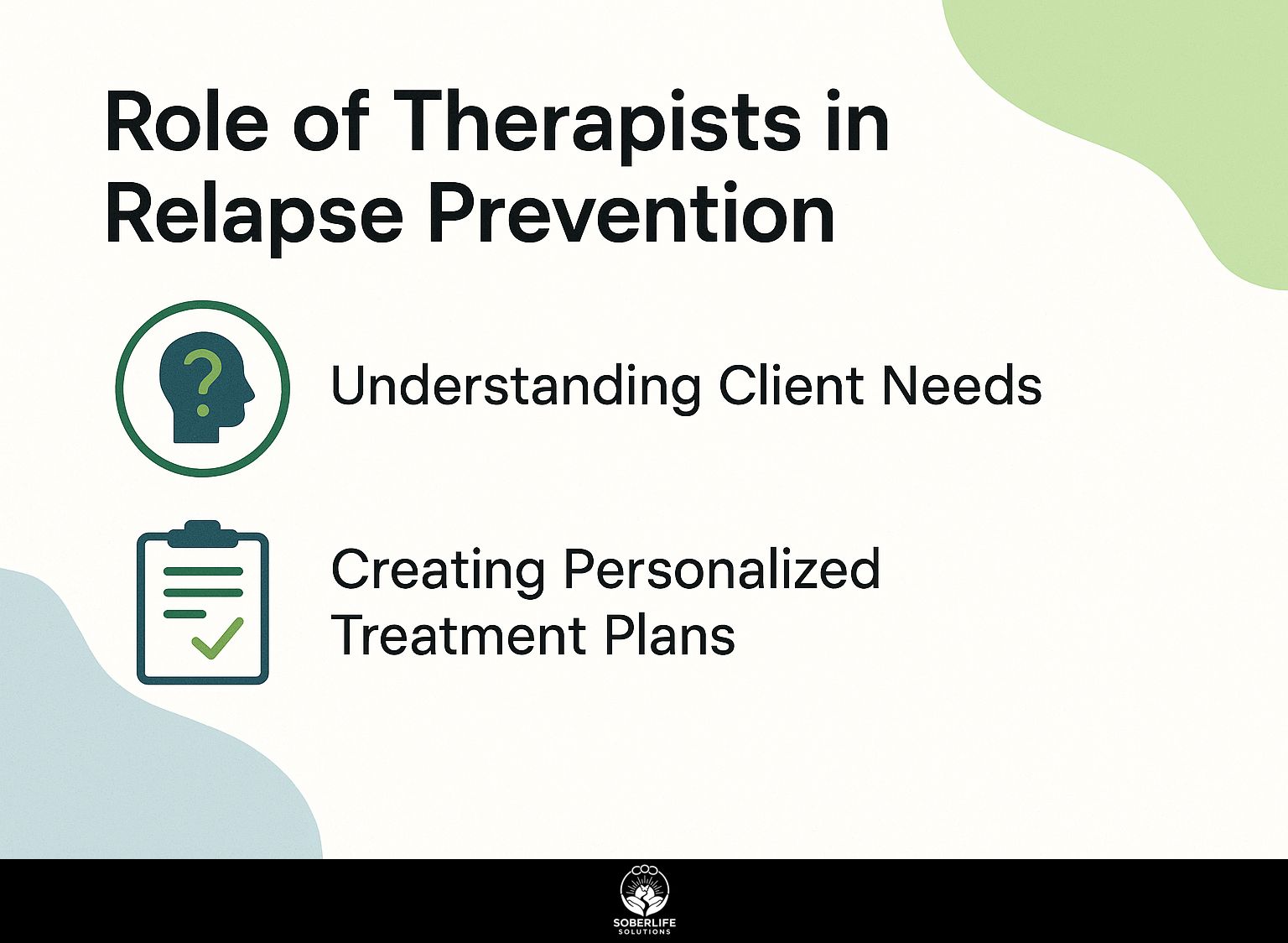
Therapists help prevent relapse by getting to know their clients’ needs and creating specific treatment plans to address personal difficulties. Understanding the various therapy techniques and their impact on relapse prevention can significantly enhance the effectiveness of these treatment plans.
Understanding Client Needs
Identifying the specific needs of clients, including psychosocial management and personal triggers, is essential in creating effective relapse prevention strategies.
Therapists can use organized interviews and regular assessments to identify these needs.
The Addiction Severity Index (ASI) helps evaluate different areas of life affected by addiction, such as physical health, mental well-being, and social relationships. According to a respected source from the United Nations Office on Drugs and Crime (UNODC), the detailed manual for ASI provides comprehensive guidelines for assessing these critical areas.
Motivational interviewing techniques can encourage clients to discuss their triggers openly. By combining these methods, we can understand the whole situation and design treatment plans that directly address the main problems, increasing the chances of recovery.
Creating Personalized Treatment Plans
Creating individualized treatment plans involves using cognitive-behavioral methods that focus on each client’s specific triggers for relapse and coping requirements.
Begin by carefully examining and pinpointing exact causes and behavior habits.
Teach clients coping skills like mindfulness or breathing exercises to help them manage their emotions.
Use motivational interviewing to talk about mixed feelings regarding change, helping clients express their reasons for wanting to recover.
For instance, if a client struggles with social situations, role-playing can be effective in building confidence.
Regularly look over and change these plans to keep them in line with the client’s changing goals and obstacles.
Essential Therapist Qualifications
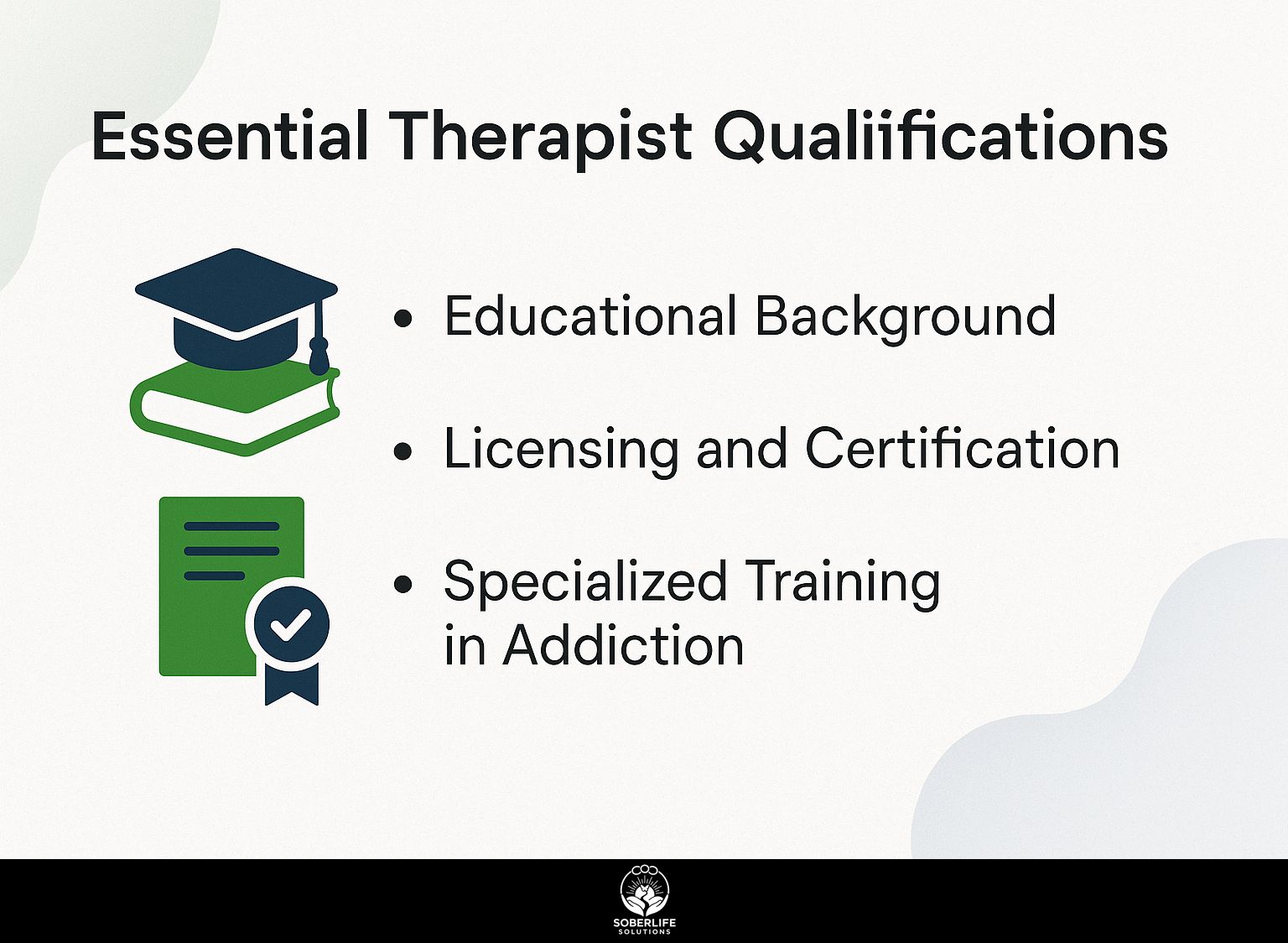
Therapists need the right education, a license, and special training to help people avoid relapsing (our guide on therapy techniques for relapse prevention delves into effective methods).
Educational Background
A solid educational background in psychology or social work is foundational for therapists specializing in substance use disorder and relapse prevention.
Anyone who wants to be a therapist should consider earning a master’s degree in counseling or psychology, focusing on addiction. Programs accredited by the Council for Accreditation of Counseling and Related Educational Programs (CACREP) provide essential training and skills.
Programs like the online Master of Social Work from the University of Southern California and the Mental Health Counseling program from the University of Massachusetts-Boston are examples.
Internships and supervision provide practical experience that is essential for developing therapy skills.
Licensing and Certification
Therapists need to get the right state licenses and can also earn credentials like the Certified Addiction Counselor (CAC) to improve their skills.
Each state has specific licensing requirements, often needing a master’s degree in counseling or social work. Supervised clinical experience is also often needed.
For example, California requires 3,000 hours of supervised experience to get a license. Acquiring certifications like the CAC, offered by the National Certification Commission for Addiction Professionals (NCCAP), demonstrates a commitment to the field and can improve job prospects.
Going to workshops and conferences improves skills and keeps professionals informed about the best treatment methods, which is important for good patient care.
Specialized Training in Addiction
Specialized training in addiction therapy equips therapists with essential skills and knowledge to apply evidence-based approaches effectively.
Continuing education is important in this changing field. Workshops are available through programs like SAMHSA’s “Behavioral Health Training Series” and the “Addiction Technology Transfer Center” network. For more detailed training resources, therapists can explore SAMHSA’s Training and Technical Assistance Center, which offers comprehensive support in addiction therapy.
These sessions cover emerging therapeutic techniques like Motivational Interviewing and Cognitive Behavioral Therapy (CBT). Online platforms like Coursera and Khan Academy offer courses specifically focused on addiction treatment methods.
Therapists who keep learning all the time can get better at their jobs and help their clients more effectively.
Therapeutic Approaches for Relapse Prevention
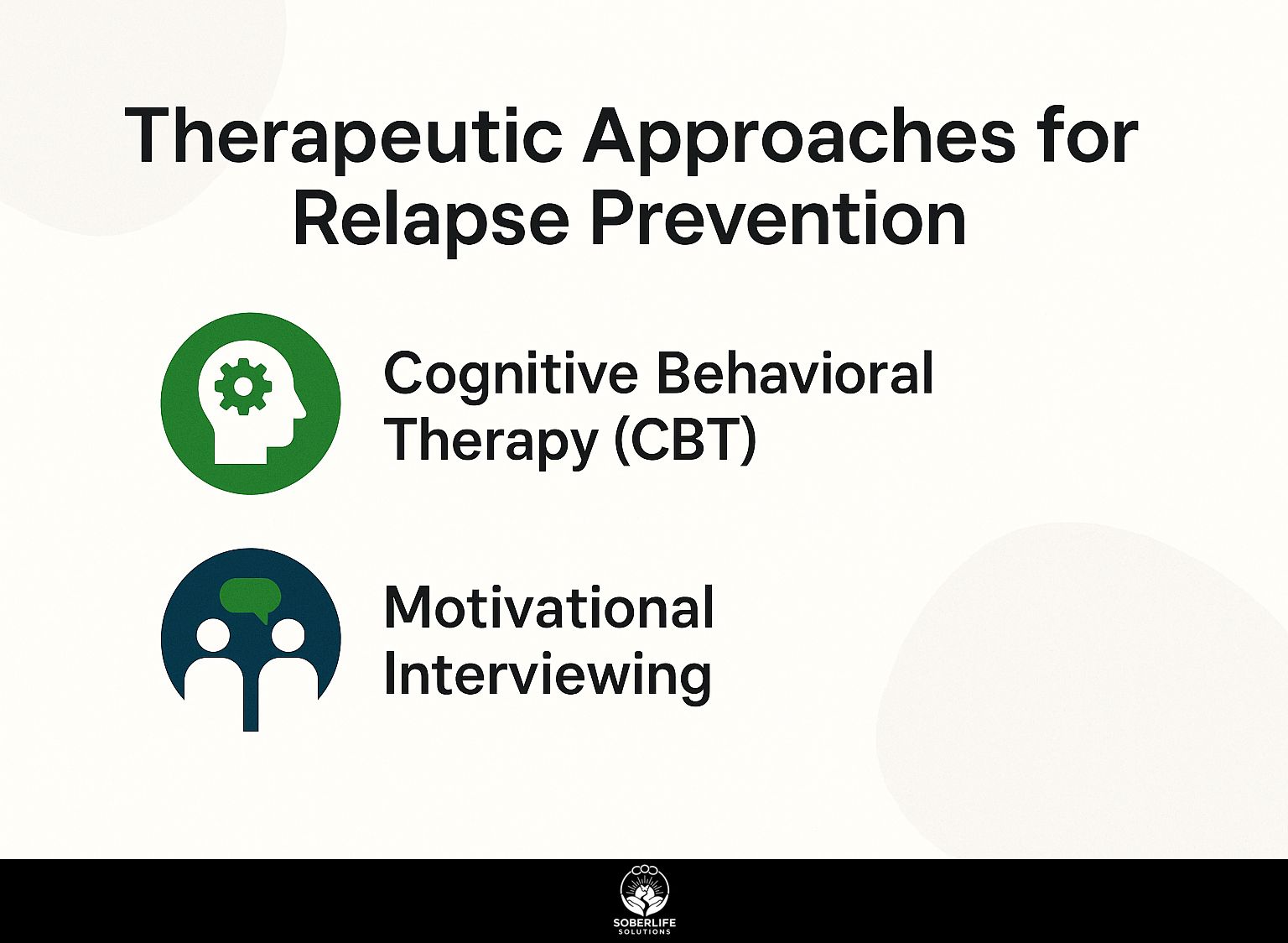
Therapies like Cognitive Behavioral Therapy (CBT) and Motivational Interviewing are important for helping clients prevent relapse. See also: Therapy Techniques: CBT, DBT, and ACT for Relapse Prevention.
Cognitive Behavioral Therapy (CBT)
Cognitive Behavioral Therapy (CBT) focuses on cognitive restructuring to help clients identify and change negative thought patterns that contribute to relapse.
To effectively implement CBT, start by identifying specific triggers that lead to negative thoughts. For example, if stress at work causes feelings of not measuring up, jot them down.
Next, develop coping strategies, such as reframing these thoughts into positive affirmations like “I am capable and appreciated.” Regularly practice mindfulness techniques, such as deep-breathing exercises, to ground yourself in the present.
A case study involving a client who managed depression through daily CBT journaling demonstrates significant improvement, showing the method’s effectiveness in combatting relapse.
Motivational Interviewing
Motivational Interviewing is a way to focus on the client that builds their confidence and supports their determination to change, which is important in preventing relapse.
Key techniques include using open-ended questions to help clients speak freely, reflective listening to show comprehension, and affirmations that build confidence.
For instance, during a session, a counselor might ask, “What changes do you see as necessary?” This invites the client to share their thoughts.
When the client talks, the counselor listens carefully, repeating important ideas, such as, “You seem to feel stressed by your cravings but are eager to get help.” This conversation builds trust, enabling clients to express their wish to change and strengthen their feeling of control.
Building a Therapeutic Alliance
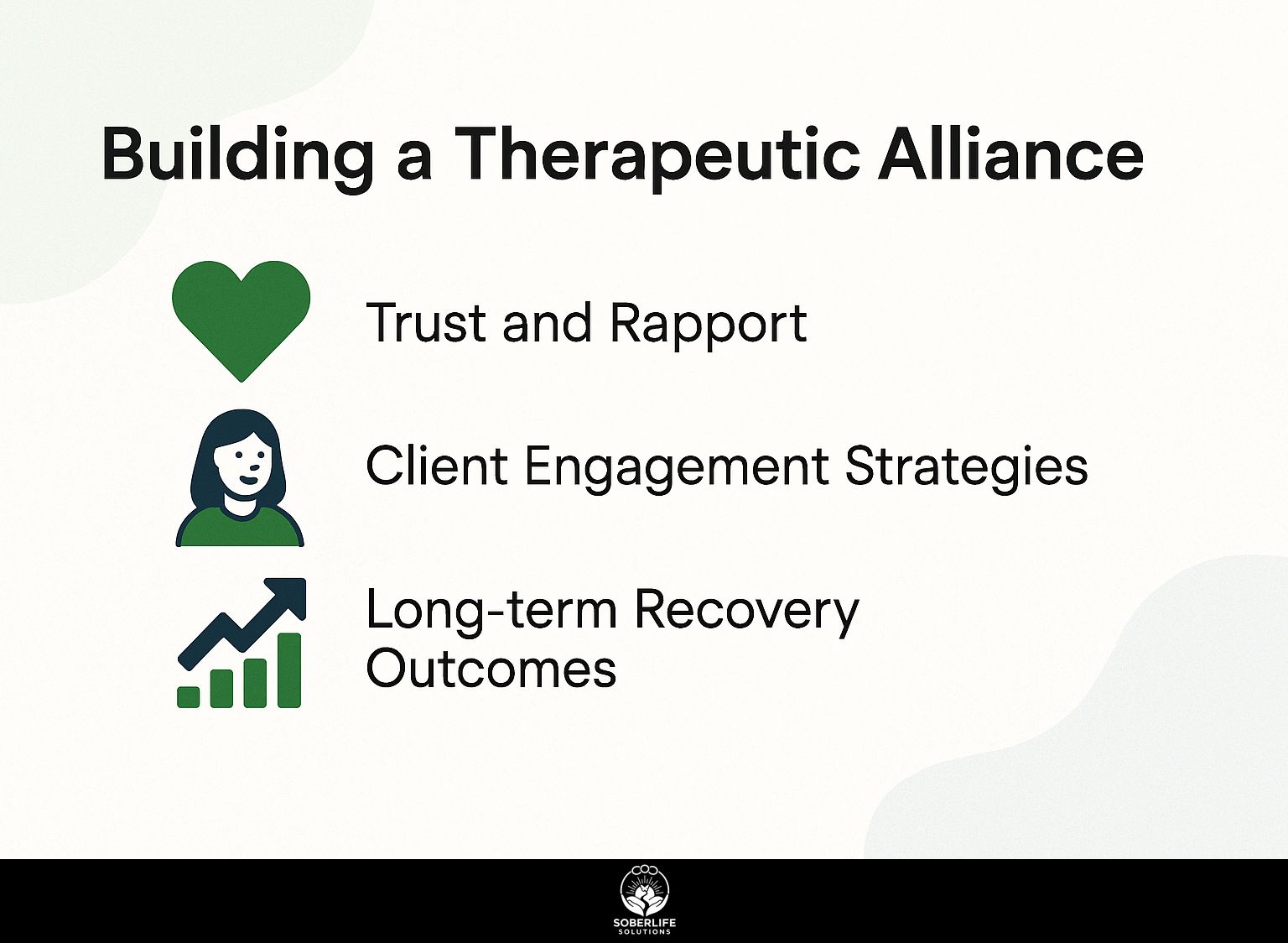
Building a good relationship between therapist and client helps build trust and keeps clients involved, which is important for effective strategies to prevent relapse. This approach aligns with the principles outlined in our comprehensive guide on Gestalt Therapy and its application in relapse prevention.
Trust and Rapport
Establishing trust and rapport is fundamental in the client-therapist relationship, significantly influencing treatment engagement and outcomes.
Therapists can build trust by using methods like active listening, which means paying close attention to a client’s words and repeating their ideas back to them.
Recognizing and accepting clients’ feelings is important; it helps clients feel comfortable sharing their thoughts and emotions. Maintaining a non-judgmental stance helps create a safe space for exploration.
Implementing these strategies has been shown to lower relapse rates, as clients feel more understood and supported, thereby increasing their commitment to the therapeutic process.
Client Engagement Strategies
Helping clients stay motivated during recovery involves methods such as increasing their drive and providing community support.
One effective approach is to set specific, attainable goals with clients, allowing them to track their progress visually.
For instance, using tools like Trello or Asana can help clients develop a clear action plan that breaks down larger goals into manageable tasks.
Setting up support groups where clients talk about their experiences builds a feeling of community. For instance, a thriving recovery group could organize weekly gatherings to talk about progress and celebrate achievements, encouraging positive actions and strengthening bonds among members.
Long-term Recovery Outcomes
Research shows that individuals who engage with qualified therapists experience a 50% higher success rate in achieving long-term recovery.
Regular treatments like cognitive behavioral therapy (CBT) and dialectical behavior therapy (DBT) help people by teaching them ways to manage their emotions and handle stress.
For instance, CBT helps patients identify and challenge negative thought patterns, leading to healthier behaviors. Building a strong support network, such as support groups and family participation, greatly improves recovery results.
Studies have shown that those participating in group therapy sessions reported a 67% reduction in relapse rates. Combining these therapies with consistent follow-ups-either weekly or biweekly-can further solidify recovery efforts.
Frequently Asked Questions
What qualifications should I look for in a therapist for relapse prevention?
When searching for a therapist to help with relapse prevention, it is important to look for someone who is licensed and has experience working with individuals struggling with addiction. You might want to find a therapist who focuses on substance abuse and has extra training in preventing relapse.
How does a therapist’s qualifications affect relapse prevention?
A therapist’s qualifications can greatly impact the success of relapse prevention. With the right qualifications, a therapist will have the knowledge and skills to help you develop coping strategies, identify triggers, and build a strong support system to prevent relapse. They will also be able to address any underlying mental health issues that may contribute to relapse.
What certifications should a therapist have for relapse prevention?
Therapists can have different certifications that help them be ready to help with preventing relapses. Look for therapists who are certified in addiction counseling, relapse prevention, and/or cognitive-behavioral therapy. These certifications show that the therapist has received specialized training in helping individuals overcome addiction and prevent relapse.
Can a therapist without the proper qualifications effectively help with relapse prevention?
While a therapist without the proper qualifications may still be able to provide support and guidance, they may not have the specific training and knowledge to effectively address the complex issues that contribute to relapse. Choose a therapist with the right qualifications and experience to improve your chances of avoiding relapse.
How can I verify a therapist’s qualifications for relapse prevention?
You can verify a therapist’s qualifications by checking their credentials with the state licensing board and professional membership organizations. You can also ask the therapist for their resume or to provide proof of their certifications. Check the qualifications of the therapist you pick to make sure they can help you avoid relapse.
Are there specific therapist qualifications for relapse prevention in my area?
The specific qualifications for therapists may vary by location, so it is best to do your research or ask for recommendations from local support groups or treatment centers. You can also contact the state licensing board or professional organizations in your area for a list of qualified therapists who specialize in addiction and relapse prevention.

